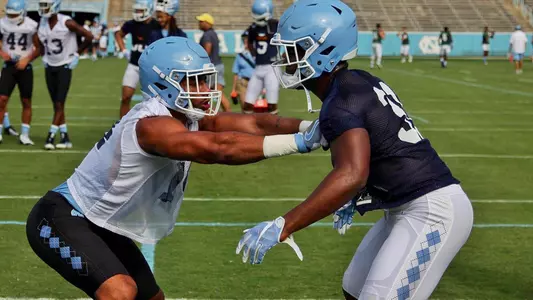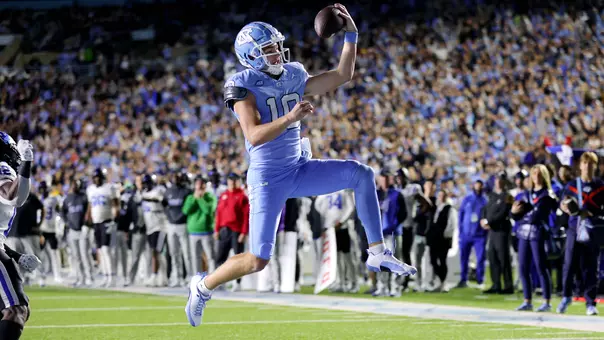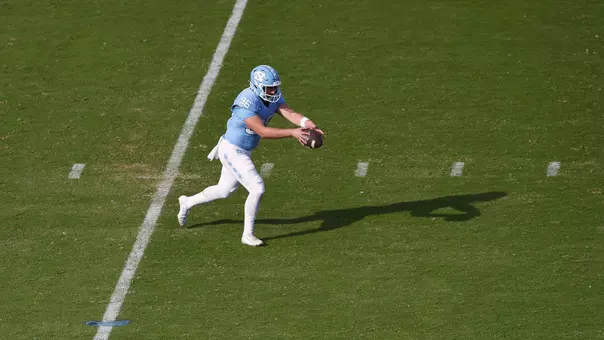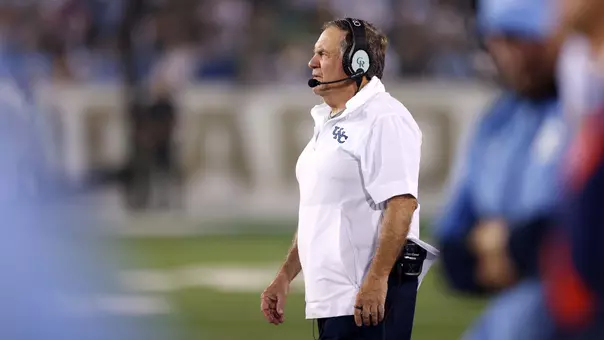University of North Carolina Athletics

Extra Points: Mastering The Mundane
August 5, 2017 | Football, Featured Writers, Lee Pace
By Lee Pace
Today's Carolina football program exudes a contemporary and cool vibe, from DJ Khaled blaring on the speakers during practice to the staff's inventive use of social media in recruiting to Coach Larry Fedora's untucked dress shirts and ability to engage 17-year-olds with modern slang and intonations. The Tar Heels' offense the last five years has averaged 454 yards and 36 points a game; few outfits short of Apple and Amazon generate those kinds of numbers.
But make no mistake—the core and heart of the program is decidedly old school. And the enemy is instant gratification.
"Society today, if you don't get an instant reward, you'll move on," Fedora says on the cusp of his sixth year leading the Tar Heels. "So many people don't understand that just by doing the smallest things over and over and over and making smart choices, you can reap huge rewards. On the other side, if you're making bad decisions and bad choices and doing that over and over, it's a recipe for disaster."
The Tar Heels are now headlong into three weeks of training camp before classes start and Fedora and his staff have their players' undivided attention—from practice and meetings in Kenan Stadium to down time in an off-campus hotel. One of their priorities is instilling in the newcomers and reminding the veterans of the mother lode of reward waiting for those with good habits, attention to detail and the capacity to not get bored hammering home unsexy skill sets.
Whether it's honing footwork and eye placement for the quarterbacks, effectively punching for the O-linemen, mastering the shrug-and-release for the defensive ends, running to the outside hip for defensive backs tracking a ball carrier, August is all about teaching and drilling ad infinitum on the field. And it's doing the little things off the field—getting on the foam rollers after practice and watching extra loops of practice tape instead of goofing off.
"Training camp sets the tone for the season," says senior tackle Bentley Spain. "The young guys have got to learn to get in their playbooks, maybe that instead of napping. And you've got to take care of your body. The cold tubs after practice, the foam rolling, proper nutrition. If you don't do those things, you'll pay a price. You have to get in the habit of doing them."
"Training camp is more mental, it's about mental toughness," adds senior defensive end Dajaun Drennon. "It's a grind, it's hot, you get tired. Staying mentally tough is the challenge. You can't get tired and let your fundamentals slide. If you don't lose focus on the little things, you go back and watch film and say, 'Okay, I'm actually getting better.'"
Fedora draws on his own experiences plus the wisdom in a library of books he devours and distills into directives for his players. One of his favorite books is The Slight Edge, a best-seller by Jeff Olson predicated on the idea that success in business, athletics, health or any facet of life is "a matter of mastering the mundane—of repeating simple little disciplines that, done consistently over time, will add up to the very biggest accomplishments." He drew on some of those points when he addressed the team Wednesday night.
"We preach doing the little things over and over and over," he says. "But the reward's down the road. Too many give up. We're trying to instill that into everyone on the team. That's the difference in the successful person and the unsuccessful one. Much of our success the last two years (19 wins and an ACC division title) is our guys bought in and understood the concept. When you think you've got it mastered is when it gets scary."
The staff the last three years has drawn on the tenets of The Program, a coaching and training service that seeks to build leadership skills and cohesive teams via two-day regimens that push athletes outside their comfort zones. During the offseason prior to the 11-3 run in 2015, Fedora gave his seniors a book called The Positive Dog and last year the featured title was Training Camp, A Fable of Excellence. Both books by Jon Gordon address the power of the mind in reaching new levels of success—simple stuff like the capacity of seeing a glass half full over being half empty, like taking responsibility 100 percent and never deflecting it on someone or something else.
This year Fedora gave his seniors the book Make Your Bed, authored by Admiral William McRaven, who drew on his 37 years as a Navy Seal to crystallize the essence of success. He harkens to his learning on his first day of Seal training why a perfectly made bed at 0600 sets the tone for the day.
"If you did it right, the corners would be square, the covers pulled tight, the pillow centered just under the headboard, and the extra blanket folded neatly at the foot of the rack," says McRaven, now the chancellor of the University of Texas System."It was a simple task, mundane at best. But every morning we were required to make our bed to perfection. If you can't do the little things right, you will never do the big things right."
Which is why after nearly every practice you'll see a coach holding a player back for some extra drill work under a searing noon day sun, like running backs coach DeAndre Smith helping Johnathon Sutton, a recent transfer from linebacker, working on his steps and shoulder rotation on the simple act of taking a handoff.
"The mesh point is our responsibility, not the quarterback's," Smith says. "The quarterback doesn't come to us, we step to him. If we go too fast, we get the ball on our hip and all of a sudden it's on the ground."
And which is why QBs coach Keith Heckendorf labors with four unproven quarterbacks the intricacies of footwork—drilling it on the field and critiquing it on tape. He can point to sloppy feet that contributed to the rare interception from Mitch Trubisky last season as well as precise fundamentals that helped Trubisky complete 304 throws in 2016 and become the second pick in the NFL Draft.
"We've been here five years and have quite a library of tape of every situation imaginable," Heckendorf says. "We can show them specifics—that little things make a major difference, they have a huge impact on the outcome of a game."
Lee Pace enters his 28th year covering Tar Heel football through "Extra Points." His book, "Football in a Forest," is available in bookstores across North Carolina and online at www.johnnytshirt.com. Email him at leepace7@gmail.com and follow him on Twitter @LeePaceTweet.
Today's Carolina football program exudes a contemporary and cool vibe, from DJ Khaled blaring on the speakers during practice to the staff's inventive use of social media in recruiting to Coach Larry Fedora's untucked dress shirts and ability to engage 17-year-olds with modern slang and intonations. The Tar Heels' offense the last five years has averaged 454 yards and 36 points a game; few outfits short of Apple and Amazon generate those kinds of numbers.
But make no mistake—the core and heart of the program is decidedly old school. And the enemy is instant gratification.
"Society today, if you don't get an instant reward, you'll move on," Fedora says on the cusp of his sixth year leading the Tar Heels. "So many people don't understand that just by doing the smallest things over and over and over and making smart choices, you can reap huge rewards. On the other side, if you're making bad decisions and bad choices and doing that over and over, it's a recipe for disaster."
The Tar Heels are now headlong into three weeks of training camp before classes start and Fedora and his staff have their players' undivided attention—from practice and meetings in Kenan Stadium to down time in an off-campus hotel. One of their priorities is instilling in the newcomers and reminding the veterans of the mother lode of reward waiting for those with good habits, attention to detail and the capacity to not get bored hammering home unsexy skill sets.
Whether it's honing footwork and eye placement for the quarterbacks, effectively punching for the O-linemen, mastering the shrug-and-release for the defensive ends, running to the outside hip for defensive backs tracking a ball carrier, August is all about teaching and drilling ad infinitum on the field. And it's doing the little things off the field—getting on the foam rollers after practice and watching extra loops of practice tape instead of goofing off.
"Training camp sets the tone for the season," says senior tackle Bentley Spain. "The young guys have got to learn to get in their playbooks, maybe that instead of napping. And you've got to take care of your body. The cold tubs after practice, the foam rolling, proper nutrition. If you don't do those things, you'll pay a price. You have to get in the habit of doing them."
"Training camp is more mental, it's about mental toughness," adds senior defensive end Dajaun Drennon. "It's a grind, it's hot, you get tired. Staying mentally tough is the challenge. You can't get tired and let your fundamentals slide. If you don't lose focus on the little things, you go back and watch film and say, 'Okay, I'm actually getting better.'"
Fedora draws on his own experiences plus the wisdom in a library of books he devours and distills into directives for his players. One of his favorite books is The Slight Edge, a best-seller by Jeff Olson predicated on the idea that success in business, athletics, health or any facet of life is "a matter of mastering the mundane—of repeating simple little disciplines that, done consistently over time, will add up to the very biggest accomplishments." He drew on some of those points when he addressed the team Wednesday night.
"We preach doing the little things over and over and over," he says. "But the reward's down the road. Too many give up. We're trying to instill that into everyone on the team. That's the difference in the successful person and the unsuccessful one. Much of our success the last two years (19 wins and an ACC division title) is our guys bought in and understood the concept. When you think you've got it mastered is when it gets scary."
The staff the last three years has drawn on the tenets of The Program, a coaching and training service that seeks to build leadership skills and cohesive teams via two-day regimens that push athletes outside their comfort zones. During the offseason prior to the 11-3 run in 2015, Fedora gave his seniors a book called The Positive Dog and last year the featured title was Training Camp, A Fable of Excellence. Both books by Jon Gordon address the power of the mind in reaching new levels of success—simple stuff like the capacity of seeing a glass half full over being half empty, like taking responsibility 100 percent and never deflecting it on someone or something else.
This year Fedora gave his seniors the book Make Your Bed, authored by Admiral William McRaven, who drew on his 37 years as a Navy Seal to crystallize the essence of success. He harkens to his learning on his first day of Seal training why a perfectly made bed at 0600 sets the tone for the day.
"If you did it right, the corners would be square, the covers pulled tight, the pillow centered just under the headboard, and the extra blanket folded neatly at the foot of the rack," says McRaven, now the chancellor of the University of Texas System."It was a simple task, mundane at best. But every morning we were required to make our bed to perfection. If you can't do the little things right, you will never do the big things right."
Which is why after nearly every practice you'll see a coach holding a player back for some extra drill work under a searing noon day sun, like running backs coach DeAndre Smith helping Johnathon Sutton, a recent transfer from linebacker, working on his steps and shoulder rotation on the simple act of taking a handoff.
"The mesh point is our responsibility, not the quarterback's," Smith says. "The quarterback doesn't come to us, we step to him. If we go too fast, we get the ball on our hip and all of a sudden it's on the ground."
And which is why QBs coach Keith Heckendorf labors with four unproven quarterbacks the intricacies of footwork—drilling it on the field and critiquing it on tape. He can point to sloppy feet that contributed to the rare interception from Mitch Trubisky last season as well as precise fundamentals that helped Trubisky complete 304 throws in 2016 and become the second pick in the NFL Draft.
"We've been here five years and have quite a library of tape of every situation imaginable," Heckendorf says. "We can show them specifics—that little things make a major difference, they have a huge impact on the outcome of a game."
Lee Pace enters his 28th year covering Tar Heel football through "Extra Points." His book, "Football in a Forest," is available in bookstores across North Carolina and online at www.johnnytshirt.com. Email him at leepace7@gmail.com and follow him on Twitter @LeePaceTweet.
Players Mentioned
UNC Softball: Tar Heels Top Coastal Carolina, 8-2
Thursday, February 12
Martina Ballen: 2026 Tar Heel Trailblazer
Wednesday, February 11
Checking In with Hubert Davis - February 10, 2026
Tuesday, February 10
Carolina Insider - Interview with Nyla Harris (Full Segment) - February 6, 2026
Monday, February 09




















